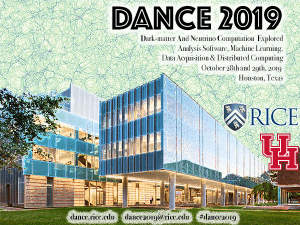Register by Sept 30th (and sooner for financial support).
This workshop will provide a venue for those working on direct-detection dark-matter experiments — and related medium-sized neutrino detectors — to discuss the challenges that we face with data. As these grow evermore sensitive to both dark matter and neutrino physics, there is an inevitable increase in size and data volume. This has resulted in researchers across these fields having to develop novel techniques to acquire, trigger, handle, analyze, model, learn, and simulate this data. This workshop will focus on these challenges, methods, and techniques, much like CHEP or ACAT does for the collider physics community. As this is the first such meeting on this topic, it will provide a forum to understand these challenges and needs for the field.
Purpose of Workshop
The workshop is aimed at medium-scale (astro) particle physics experiments focusing on topics in dark matter and neutrino physics. This workshop emerged from discussions with various noble liquid detectors for a presentation of “community input” to the HOW2019 meeting of HEP software and computing experts to give ideas on how the dark-matter field could be supported. The talk is available here.
The goals below are intended to provide initial direction with the expectation of evolving to be more representative of the goals of the community.
Short-term initial goal
This workshop will immediately address the lack of a forum in which the community has been able to discuss the computational aspects of the experiments. As the field becomes more data intensive, the computational challenges that we have faced became significant. Therefore, this workshop inherits the model of related workshops in the field that have proved useful for detector design, cryogenics development, calibration methodology, and statistical modeling to advance the field generally and uniformly. The workshop aims to elucidate and recognize novel work within each experiment.
Long-term initial goal
Part of the workshop is to identify the needs of the field related to cyberinfrastructure and researcher training to achieve dark-matter scientific goals and related community building. For example, the LHC High Luminosity upgrades is an example of apparent cyberinfrastructure needs, resulting in the NSF funding the IRIS-HEP institute to support work for multicollaboration multinational science. Similarly, FIRST-HEP addresses training needs to ensure students are equipped with the skills required for their scientific careers and beyond. The dark-matter community is around one fifth of the size of the collider community, yet has limited cyberinfrastructure investment since dark-matter experiments are not at a single major multi-user research facility.
- Need: is there a cyberinfrastructure need for us to accomplish dark-matter scientific goals and what can we learn about how other communities grew (e.g. this)?
- Future experiments: are there common needs that additional resources could help address, especially with the long-term view of next-generation experiment? (e.g. NSF CSSI or DOE SciDAC)
- ML: are there common machine learning challenges on precision rare-event datasets where, if overcome, would bring the field to a tipping point in the science?
- Training: would having a stronger software/computing community help us address career development and training of dark-matter young data scientists? (e.g. NSF Cybertraining)
This meeting is financially supported by Rice Creative Ventures. (Related: please register early if you want to be eligible for travel support.)
The flyer is here if you would like to post it up at your institution (click for full size).

